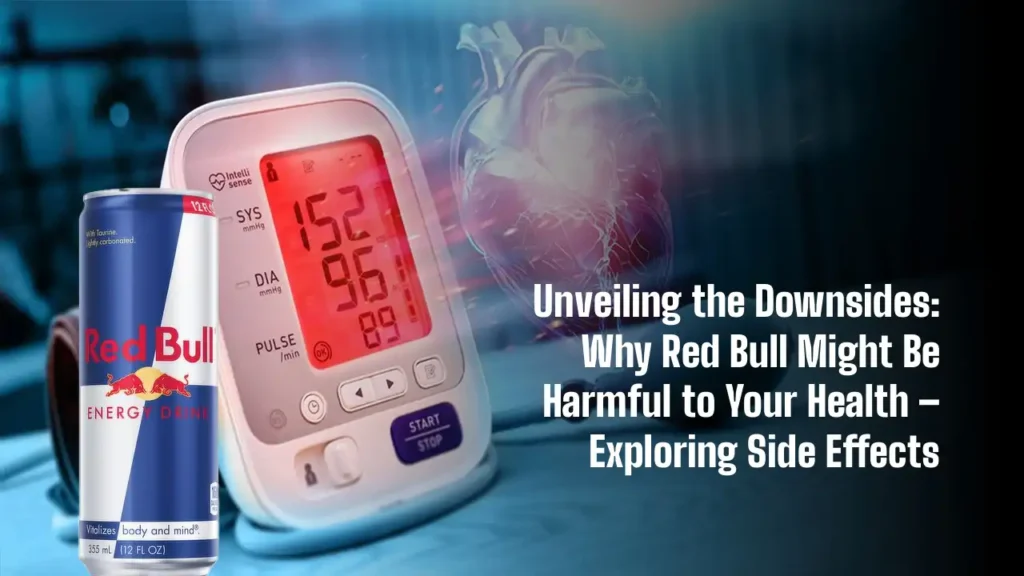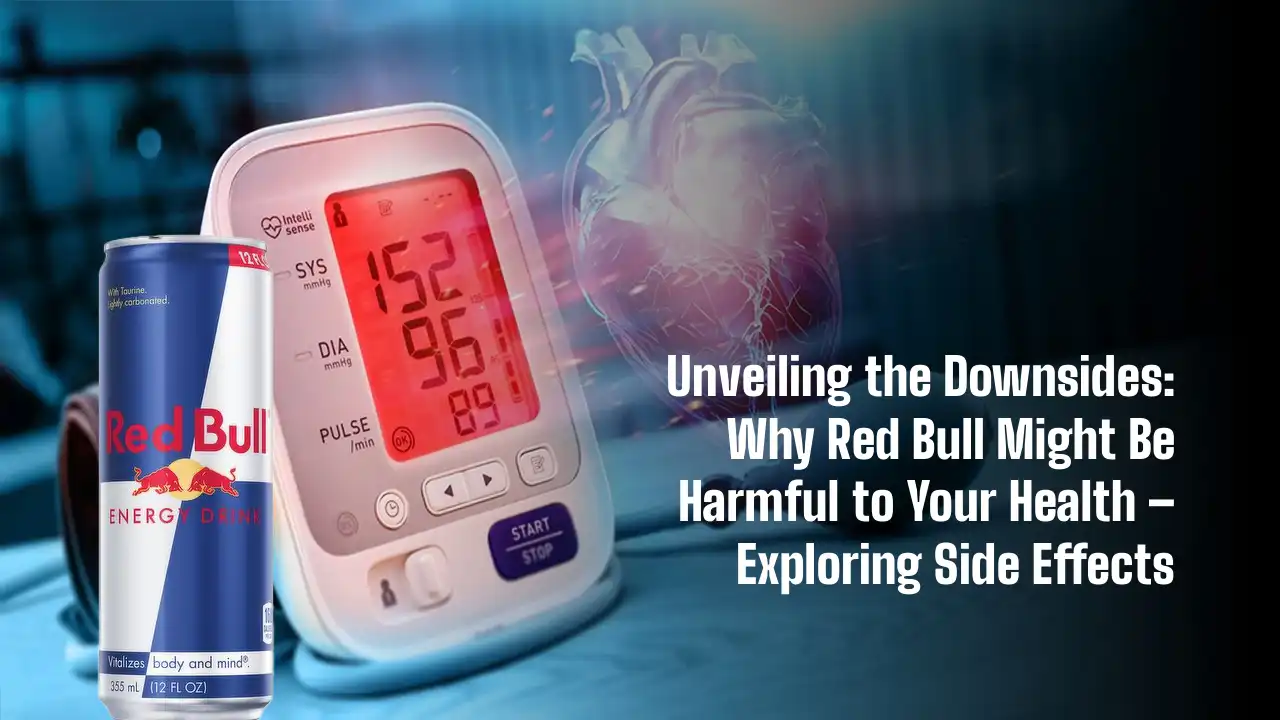by Jaya Pathak
Unveiling the Downsides: Why Red Bull Might Be Harmful to Your Health – Exploring Side Effects
Red Bull is a popular fizzy energy drink known for its ability to boost energy and performance. However, mixing it with alcohol can be risky, and its high sugar content raises concerns about its impact on health. Unlike coffee or tea, which may be healthier options, Red Bull lacks substantial nutritional benefits. Introduced in 1987 in Austria, Red Bull contains caffeine, vitamins, and taurine to enhance energy levels.
It also contains sugar, water, and other ingredients. While some varieties like Red Bull Zero and Red Bull Sugarfree use alternative sweeteners, excessive consumption of Red Bull can lead to adverse effects. With 112 calories and 27 grams of sugar per small can, moderation is essential to avoid potential health issues associated with its ingredients. Understanding the risks and limitations of Red Bull consumption is crucial for maintaining overall well-being. It’s important to be mindful of consumption levels to prevent adverse effects on health.
Side effects of Red Bull
01. Raises Blood Pressure and Heart Rate:
Red Bull can make your heart beat faster and increase your blood pressure. These are important for heart health, and high levels can lead to problems like high blood pressure and heart disease. Studies show that drinking just one can of Red Bull can significantly raise blood pressure and heart rate for up to 24 hours. This happens because Red Bull has caffeine, like coffee does.
While drinking Red Bull occasionally might not cause big heart problems, too much of it, especially in young people, can be dangerous. It could lead to abnormal heartbeats, heart attacks, and even death. People with high blood pressure or heart disease need to be extra careful because drinking Red Bull could make their condition worse and might even be life-threatening.
02. Raises the risk of diabetes:-
Drinking sugary drinks like Red Bull might make you more likely to get type 2 diabetes. Too much sugar, especially from sweetened drinks, can increase the risk. Studies show that having 1–2 servings of sugary drinks each day can make your chance of getting type 2 diabetes go up by 26%. Red Bull has sugar in it — about 29 grams in one small can.
If you drink Red Bull every day, it could make your risk of type 2 diabetes higher. It’s important to be aware of how much sugar you’re drinking, as it could affect your health in the long run.
03. Tooth Trouble:-
Drinking acidic beverages, like Red Bull, can hurt the hard outer layer of your teeth called enamel, which shields them from decay. Research suggests that Red Bull, being acidic, might damage your tooth enamel with regular intake. A study exposed human tooth enamel to energy drinks, like Red Bull, for just 15 minutes, four times a day over five days.
The result was a significant and permanent loss of tooth enamel. Surprisingly, the study found that energy drinks were twice as harmful to enamel compared to soft drinks. Taking care of your teeth is important, and being aware of the potential harm from acidic drinks like Red Bull can help you make choices that keep your smile healthy and bright.
04. Caution for Kidneys:-
While the occasional sip of Red Bull is unlikely to harm your kidneys, ongoing and excessive consumption may pose risks to kidney health. A study conducted on rats over 12 weeks hinted at a potential decline in kidney function with chronic Red Bull intake.
However, these findings haven’t been confirmed in human studies yet. Moreover, research suggests a connection between consuming too much sugar and an increased risk of chronic kidney disease. Given that Red Bull is loaded with sugar, constant and excessive consumption may elevate your risk. It’s essential to be mindful of how often you indulge in energy drinks, as overdoing it could have implications for your kidney health in the long run.05.
05. Connection to High-Risk Behaviour:-
Drinking Red Bull has been linked to more risky behaviour, especially when mixed with alcohol. When you have both, the caffeine in Red Bull can make you feel less drunk while still being impaired by alcohol. This combination can lead to serious consequences.
Studies found that college students who had energy drinks with alcohol were more likely to drive under the influence and get hurt due to alcohol than those who only drank alcohol. Even without alcohol, research suggests that young adults who regularly drink energy drinks like Red Bull may be more likely to have problems with alcohol and use illegal drugs. While not everyone who drinks Red Bull will take risks, it’s crucial to know the possible dangers, especially for young adults and when alcohol is involved.
06. Caffeine Concerns and the risk of overdose:-
Caffeine, found in Red Bull, should be limited to 400 mg or less per day in adults for safety. With 75 mg of caffeine in a small Red Bull can, having more than 5 cans daily might increase the risk of caffeine overdose. Since caffeine stays in your blood for a while, it’s hard to say exactly how much Red Bull could lead to overdose.
Especially concerning for those under 19, who should keep their caffeine intake under 100 mg per day. Exceeding one can of Red Bull in this age group raises the risk of caffeine overdose. Symptoms include nausea, rapid heart rate, and trouble sleeping. Being mindful of your caffeine intake, especially in younger people, is crucial to avoid potential health issues.
Sugar-Free Red Bull as a “Healthier Choice?”
Sugar-free Red Bull offers a lower-calorie and lower-sugar alternative to the regular version but comes with some considerations. Although it lacks sugar, it mirrors the caffeine content of regular Red Bull, potentially carrying the same side effects related to caffeine intake. Despite the absence of sugar, sugar-free Red Bull contains artificial sweeteners like aspartame and acesulfame K. These sugar substitutes, while providing sweetness without the calories, have been linked to an increased risk of type 2 diabetes in some studies. Additionally, artificial sweeteners have their own set of safety concerns and potential side effects.
In summary, opting for sugar-free Red Bull can be a choice for those aiming to reduce sugar and calorie intake. However, it’s crucial to be mindful of the shared caffeine content and the inclusion of artificial sweeteners, which may have implications for health. As with any dietary choice, moderation and awareness of potential risks are key to making informed decisions about one’s well-being.
Excessive consumption of Red Bull and similar energy drinks has been associated with rare but severe outcomes such as heart attacks and even death, particularly among younger adults with reported habits of excessive energy drink consumption. While guidelines recommend limiting caffeine intake to 400 mg daily for healthy adults, fatal cases of caffeine overdose typically involve much higher daily intakes, often ranging from 3 to 5 grams of caffeine, equivalent to consuming around forty 8.4-ounce cans of Red Bull in one day.
Surprisingly, cases of heart issues and sudden death associated with energy drinks have been reported in individuals who consumed far fewer cans, sometimes just 3 to 8 in a single day. Recent research indicates that even moderate consumption of energy drinks, such as drinking 32 ounces of Red Bull daily for three days, can lead to significant changes in heart rhythm, potentially predisposing individuals to arrhythmias and sudden death, especially those with existing heart conditions or high blood pressure.
Moreover, it’s suggested that the adverse effects may not solely stem from caffeine but could also involve other ingredients present in Red Bull. Given these risks, certain groups including pregnant women, children, individuals with heart problems, and those sensitive to caffeine should steer clear of Red Bull entirely. While more research is warranted to elucidate the precise mechanisms behind these risks, it’s crucial to exercise caution and moderation when consuming energy drinks like Red Bull.
In conclusion, Red Bull, a sugar-sweetened, caffeinated energy drink, poses potential serious and life-threatening side effects, particularly with excessive or frequent consumption and when combined with alcohol. It is strongly advised that pregnant women, children, individuals with heart issues, and those sensitive to caffeine completely avoid Red Bull.
Given its high sugar content and minimal nutritional value, opting for healthier alternatives like coffee or tea is recommended to maintain energy levels without exposing oneself to the potential risks associated with the ingredients in energy drinks. Prioritizing informed and health-conscious choices can contribute to overall well-being and vitality.











